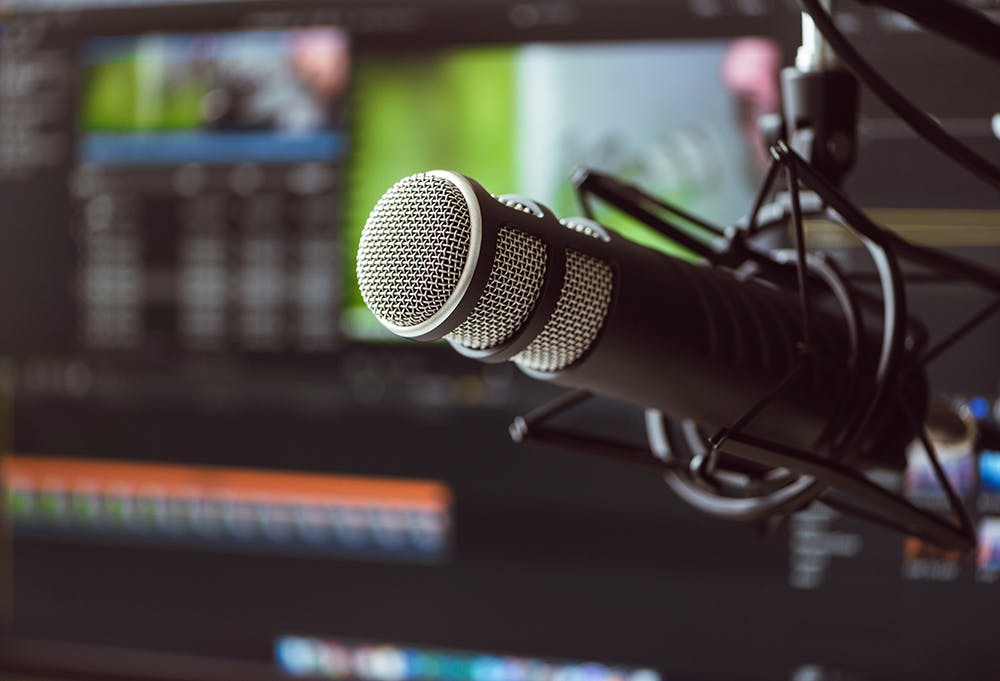It is well known that the global podcasting industry has been growing rapidly over the past years – jumping up during Covid-19, thanks to our universal need to find new ways to entertain ourselves at home – with total market size expected to reach USD 130.63 billion by 2030. This growth is being driven by several factors, including the increasing popularity of smartphones, the growing availability of high-speed internet, and the increasing appetite for on-demand audio content.
One of the biggest players to gain prominence in the podcasting industry has been Spotify, who has invested heavily in podcasting in recent years, and now has a large library of original and exclusive podcasts. However, Spotify has also been facing some challenges in the podcasting space and, in recent months, has seen a decline in its stock price, along with criticism for its handling of podcaster Joe Rogan.
Podcasts are still a relatively small medium, but one that continues to scale rapidly, with the number of podcasts available on Spotify growing to 4 million in 2023 (though only about 155 000 of those are actively updated). With an undeniable growth in commercial and consumer interest over the past few years, audio platforms have raced to expand into podcasts. Global streamers and domestic audio players alike are still investing heavily in podcast content, distribution, and advertising technology – with discoverability, exclusives, and personalisation at the heart of the race to become market leader.
Other key players in the space now include Apple, Amazon, and iHeartRadio – although it has been shown that 41% of regular podcast listeners use Apple Podcasts. Because of this competition, the quality of podcasts is also improving – as is the amount of money being spent on podcast advertising, which is expected to reach $2.28bn in the US alone in 2023. Luckily the number of podcast listeners continues to increase, with weekly reach growing from 9% in 2017 to 17% in Q3 2021 (although the medium still only commands a relatively small 5% of audio time among those aged 15+).
There were 120m monthly podcast listeners in the US in 2022 and since 2014, the percentage of Americans aged 12+ who have listened to a podcast has jumped from 30 to 62 percent, for a total of 177 million. In the UK in 2021, 41% of adults aged 16+ have listened to a podcast in the last month, and companies in the sector are using M&A to acquire new podcast content or tools for monetisation. Almost nine in ten people who listened to podcasts regularly in 2022 said that they liked the convenience of being able to listen to podcasts when it suited them.
However, this rapid growth also means that the podcasting market is becoming increasingly crowded, and it can be difficult for new podcasts to break through and gain an audience. Although the number of listeners and advertising revenue are increasing, the economics of podcasts can be challenging, with advertising often shaking out expensive, difficult to measure effectively and hard to target to key listeners accurately.
The past 18 months in particular have not all been smooth sailing – the number of podcasts launched in 2022 fell by 80% to 219,000, down from 729,000 in 2021 and 1,109,000 in 2020 at the height of the global lockdowns. A number of podcast producers have made layoffs (Vox Media & Pushkin Industries), budget-cuts, and cancelled deals (Amazon, SiriusXM, NPR); with Spotify making perhaps the most high-profile about-face from spending more than $1 billion in recent years, acquiring production companies and signing exclusive deals with the likes of Joe Rogan and Kim Kardashian, to reducing podcast staff for the third time in five months this January, including a resignation from chief content officer, Dawn Ostroff.
Getting in big-name talent has been a key tactic over the past few years, particularly for the likes of Spotify – and some have been very successful. Until Joe Rogan’s fall from grace, Spotify were happy to have him as their most popular flagship podcast, and the Harry and Megan multi-million deal collapse has been well-documented over recent weeks.
Overall, the global podcasting industry is growing and dynamic. There are both challenges and opportunities in the space, but the future still looks bright.
CASE STUDY: SPOTIFY & STORYTEL
- Recently, Joe Rogan — the man responsible for delivering an outsized portion of Spotify’s podcast ad revenue — invited an anti-vaxxer presidential candidate on his show and the same day, a $20 million podcast deal with a certain royal couple fell apart. This followed two rounds of layoffs in 2023 alone, the latter of which primarily focused on Spotify’s podcast division.
- Spotify knows something is wrong with its podcast strategy — and these past few weeks have proven it. The company’s missteps reveal how fundamentally different the formula of success is in podcasts from film, video games, books, and even music. Franchises, IP, and name recognition can be enough to deliver a hit across many different mediums. But in the world of podcasts, a series from an acclaimed filmmaker, best-selling author, or even a former president can barely register on the charts. And after years of chasing this hit-making strategy, it all seems to be falling apart.
- One pillar of Spotify’s podcast strategy was meant to be originals from its in-house studios. Spotify spent big to acquire two of the best: Parcast and Gimlet, the latter of which won a Pulitzer for its reporting earlier this year. Gimlet and Parcast also produce the kind of prestigious, narrative-led podcasts that Hollywood studios love to snatch up for IP.
- Yet despite coming with their own excellent staff and built-in audiences, Spotify’s lack of direction and knowledge of the podcasting space proved to be a death sentence for Gimlet and Parcast. The studios failed to attract large audiences and develop hit new shows. Existing shows didn’t get the right marketing or support from Spotify. Keeping certain podcasts exclusive to Spotify meant a drop in audience. This culminated in the platform axing over 200 roles throughout Gimlet and Parcast earlier this month and absorbing what remained into Spotify Studios.
- The next pillar of Spotify’s podcast strategy was splashy, usually celebrity-driven originals. Some of these have worked out, like the Batman Unburied podcast by David S. Goyer or the Case 63 scripted drama with Julianne Moore and Oscar Isaac. But many have not. Spotify’s most troubled celebrity deal with Prince Harry and Meghan Markle’s production company, Archewell Audio, came to an anticlimactic end. Under the deal, Archewell should have produced multiple projects. But reports suggest that the couple couldn’t (or wouldn’t) deliver, and the deal only yielded a 12-episode interview podcast and a holiday special episode. The lack of output led to the $20 million deal’s demise, and the couple reportedly didn’t receive the full payout.
- Prior to the Archewell fallout, Spotify’s deals with several other high-profile, star-driven studios and creators came to an end, including Barack and Michelle Obama’s production company, Higher Ground, Brené Brown, and Ava DuVernay. Higher Ground opted not to renew its contract with Spotify last year, citing a desire to no longer have its shows locked to one platform. A multiyear exclusive deal with DuVernay didn’t lead to a single podcast — both parties also cut ties last year.
- As pillars of Spotify’s podcast strategy continue to falter, Spotify seems to be shifting its attention to one big – and much more obviously lucrative – remaining element: its ability to sell ads.
- “Spotify is in a very unique position of figuring out how to make things work in a way that will benefit them. But they haven’t done it yet,” podcast strategist Eric Nuzum told Hot Pod. According to Nuzum, until Spotify figures out what makes its platform stand out from competitors like Apple, Stitcher, SiriusXM, and others, it won’t matter who they sign up. The company is still far from the most popular platform for podcasts. That distinction belongs to YouTube, while Apple Podcasts has the largest number of downloads (thanks largely to its automatic downloads feature) — accounting for 71 percent of downloads, compared to Spotify’s 9 percent, according to Podtrac figures from March.
- Conversely, Storytel, one of the world’s largest subscription services for audiobook streaming, recently announced an exclusive partnership with the leading AI speech software provider ElevenLabs. The collaboration will involve the development of AI voices specifically tailored to Storytel’s core markets and the production of AI narrated audiobooks. A new VoiceSwitcher feature will allow enhanced personalisation of the Storytel service at scale, facilitating truly unique listening experiences customised for every ear.
- Part of Storytel’s strong position lies in its combined Publishing and D2C Streaming proposition. Content from the Publishing business creates a differentiated content line-up that benefits the Streaming business, while opportunities created by the Streaming business enhance Storytel’s value proposition for authors.
- Rather than a global expansion, Storytel’s current focus is on ten core markets with high audiobook penetration or high incremental growth potential, including the Nordics, US, Netherlands, Poland, Turkey and Bulgaria, in which Storytel already has a leading position.
FURTHER READING:
Spotify’s podcast plan is going off the rails, The Verge, 21 June 2023
Storytel presents mid-term financial targets and strategic direction to further strengthen its leading position, Cision PR Newswire, 13 June 2023
Storytel enters strategic partnership with ElevenLabs and announces upcoming launch of new VoiceSwitcher feature, Cision PR Newswire, 13 June 2023
Storytel to Pilot AI Audiobook Narration; Aims for Organic Growth, Publishers Lunch, 20 June 2023




